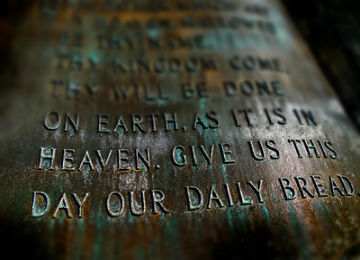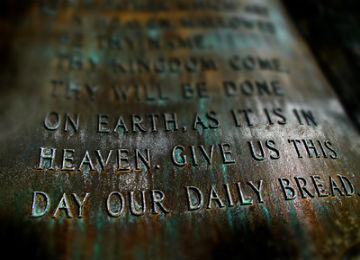
PlaceForTruth.org has started a new podcast! This week's podcast features an interview with Dr. Nick Needham about the Fall. This article is also geared toward the theme of the Fall. Keep an eye out for more material related to the podcast, and make sure to follow along with the conversation!
2 Samuel 11-19
Some time ago, in a question-and-answer period, someone asked, “Dr. Boice, is it possible for a Christian to commit murder?”
I suppose the questioner held the view that there should always be a basic minimum of sanctification in a Christian that prohibits such things. But I answered as I always answer such questions, saying, “Yes, a Christian can certainly do that.”
A Christian can murder, steal, commit adultery, run off and leave his family, and allow his life to be filled with such bitterness that he is a terror to all around him. In general, a Christian can make a total wreck of his life. The Bible itself suggests this when it warns Christians against such sins.
We must not think, of course, that God will permit sin in the life of a Christian to go undisciplined. And we must acknowledge that there is generally a point in our lives beyond which He will not let us go. We all sin, in big ways or little ways. We taste its consequences. Sin turns ugly. Pleasures turn to dust in our mouths. But this happens so that we will come to the point—as God intends—when we will yearn for the joy we once knew, and will turn to Him for His perfect forgiveness and cleansing.
We come now come to an incident in the life of King David in which this greatest of all Israel’s kings, the one who was called “a man after God’s own heart,” sinned by committing adultery and then compounded that sin by an act of murder. It is a sad and solemn record. But we turn to it humbly in order that we might learn something of the depth of our own human depravity and that we might learn how to turn to God for cleansing.
The Sin of King David
The Bible says that in the time of the year when kings went forth to battle, that is, in the spring after the enforced inactivity of winter, David sent Joab and the troops of Israel out against the Ammonites. “But David,” we are told, “tarried still at Jerusalem” (2 Samuel 11:1). It is an ominous “but” for it indicates the disapproval by the Lord of David’s action. During this period, David saw Bathsheba bathing on a roof nearby. He sent messengers to find out who she was. They brought back word: “Is not this Bathsheba, the daughter of Eliam, the wife of Uriah, the Hittite?” (verse 3).
That should have been the end of the matter for David; Bathsheba was another man’s wife. But instead, he took her to himself and later learned that she had conceived a child by him. We can imagine that at this point David’s blood ran hot and cold. But instead of confessing his sin, he set out upon a course that greatly compounded it.
First, he invited Uriah home from the battle on the pretext of learning about it, hoping that the man would spend a few nights at home with his wife so that he could be identified as the father of the child. However, Uriah was more conscious of his duty than King David was of his. He would not go home but said, “The Ark, and Israel, and Judah abide in tents; and my lord, Joab, and the servants of my lord, are encamped in the open fields. Shall I, then, go into mine house, to eat and to drink, and to lie with my wife? As thou livest, and as thy soul liveth, I will not do this thing” (verse 11).
Uriah refused to go home, even when David made him drunk. Therefore, David sent a note to Joab by the hand of Uriah saying that Uriah was to be placed in a position in the battle where the fighting was hottest, abandoned, and left to be killed.
Joab must have wondered how David, the man who could write such beautiful, spiritual poetry and who would not act against King Saul, could command such a murder. For murder it was. Nevertheless, he did as David commanded. Uriah died. David breathed a sigh of relief and satisfaction. Yet we read: “But the thing that David had done displeased the Lord” (verse 27).
Repentance
Matthew Henry, the well-known Bible expositor, once said, “Though God may suffer his people to fall into sin, he will not suffer his people to lie still in it.” This is quite true. Thus, instead of abandoning David, God sent the prophet Nathan to confront him with his sin. Because of this David repented.
Nathan had said, “Thou art the man” (2 Samuel 12:7).
And David replied, “I have sinned against the Lord” (verse 13).
On the basis of that confession, God forgave David’s sin—although he still had to suffer many of the consequences of it—and restored him to complete fellowship.
But how can a righteous God restore to fellowship a man who has committed adultery and then murdered an innocent man? The answer to that question lies in a great psalm that David wrote as the result of this incident in his life. It is important. For if we understand this psalm, we can understand not only how God could forgive King David but also how God can forgive us, no matter how great or small our sins may be.
Psalm 51 begins, “Have mercy upon me, O God, according to thy loving-kindness; according unto the multitude of thy tender mercies blot out my transgressions” (verse 1). Notice how many times this single verse speaks of God’s mercies. It says, “Have mercy upon me . . . according to thy loving-kindness; according to the multitude of thy tender mercies.” Three times! Thus, when David turned again to God in the aftermath of his sin, the first thing he asserts is his confidence in God’s mercy.
Now and then, as I speak to people who do not know the Lord, someone will say that he only wants justice from God. And I say, woe to that person. The man who wants only justice from God will receive hell and spiritual death, for death is the just punishment for sin (Romans 6:23). How wonderful to know that instead of coming to God on the basis of His justice, we can come on the basis of His mercy, the way David came.
Confession of Sin
The basis of forgiveness of sin, then, lies in God’s mercy. But this is only the first of several principles that we must apply in our search for forgiveness.
The second is that the condition for forgiveness of sin lies in our confession of it. As soon as David recalled God’s mercy, he immediately confessed his sin: “For I acknowledge my transgressions, and my sin is ever before me. Against thee, thee only, have I sinned, and done this evil in thy sight, that thou mightest be justified when thou speakest, and be clear when thou judgest” (Psalm 51:3, 4).
David laid his sin before the Lord and confessed it utterly. This is the significance of verse four: “Against thee, thee only, have I sinned.” Many people have observed that this was not entirely true. David had sinned against Bathsheba, as well as with her. He had sinned against Uriah, her husband. He had sinned against the armies of Israel, who lost a battle during the time of David’s sin. He had sinned against the nation. Above all, however, he had sinned against God, and in his own mind this greatly overshadowed the other aspects of his offense.
How great a difference there would be in your life and mine if we would only see our sin for what it is in God’s sight and confess it openly.

The Alliance of Confessing Evangelicals is member supported and operates only by your faithful support. Thank you.















 © Alliance of Confessing Evangelicals
© Alliance of Confessing Evangelicals


